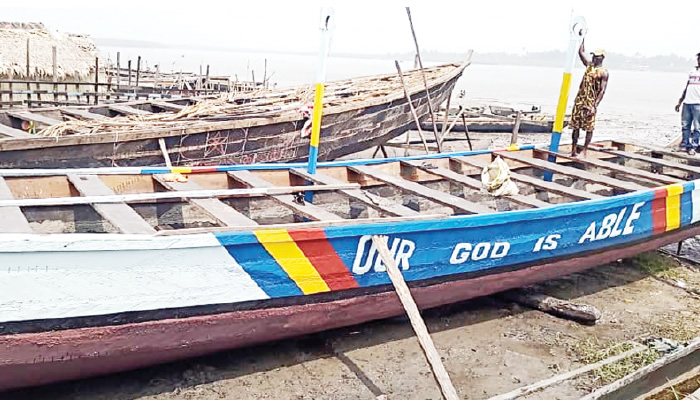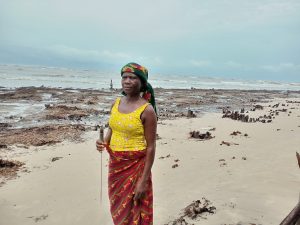Fisherfolks in Akwa Ibom Suffer Untold Hardship Due to Climate Change, Fossil Fuel Extraction

By Ekemini Simon
In this report, Ekemini Simon examines how pollution from fossil fuel extraction has destroyed the livelihood of fisher-folks in Akwa Ibom State and how the companies and government agencies aggravated the hardship of these vulnerable communities by withholding and mismanaging their remediation funds.
Akwa Ibom State is among the second highest producers of crude oil in Nigeria. All the oil produced in the oil-rich State since exploration commenced in 1955 stem from its coastal communities where fishing is the primary source of livelihood.
Ibeno local government area where Seplat Energy’s terminal is located is at the centre of the highest crude oil extraction in the State. Majority of the population here rely primarily on fishing since it is a riverine local government area.
Fisherfolks Blame poor catch on Gas Flaring
In recent times, fisherfolks have identified rising water temperature as another key problem that has caused fish drought to them in their waters. They report that fish have now migrated to comfortable water zones leaving their waters unproductive for fishing. They blame their troubles on gas flares by transnational oil companies operating in their waters.
” Due to several gas flaring points in our water, the water has become so hot that it drives away many species of fish. We used to have whales in our water and whales would always move with several other fishes which would result in great catch. But now, we no longer find it among other species of fishes”, Loveday Loveday, a fisherman who resides in Okoroitak, Ibeno said.
Although the federal government of Nigeria had ratified the Paris Climate Change Agreement and is a signatory to the Global Gas Flaring Reduction Partnership (GGFR) principles for global flare-out by 2030 while committing to a national flare out target by year 2025, the progress has been slow. Nigeria only recorded progress in reducing gas flare in 2022 according to World Bank’s report.
However, coastal communities in Akwa Ibom State have continued to suffer the impact of gas flaring. For instance, analysis of data from Nigerian Gas Flare Tracker of National Oil Spill Detection and Response Agency (NOSDRA) shows that there are still 41 flaring sites from oil exploration facilities within Akwa Ibom territorial waters. Within March 2012 and December 2024, these facilities flared 1.701 billion Thousand Standard Cubic Feet (MSCF) of gas valued at 5.539 billion United States dollars.
Joseph Essien, Professor of Environmental Microbiology and Biotechnology University of Uyo said that gas flaring among other greenhouse gases contribute to ocean warming and sea level rise.
He added “When the ocean takes in a lot of energy, it takes a longer time to dissipate. When the temperature is far from what should be sustainable, it warms the ocean and that can lead to sea level rise”. But the impact of gas flaring on the environment and lives of these fisherfolks could have been reduced if the provisions provided by the Petroleum Industry Act to protect communities where oil/gas exploration take place is adhered to.
Company/ NUPRC Flout PIA on Gas Flare Elimination Plan
The Petroleum Industry Act has mandated companies to make plans for the elimination of gas flaring.
Section 108 of the PIA provides ” Notwithstanding any provision to the contrary under this Act, a licensee or lease producing natural gas shall, within 12 months of the effective date, submit a natural gas flare elimination and monetisation plan to the Commission, which shall be prepared in accordance with regulations made by the commission under this Act”.
Investigations reveal that although the 12 months period from August 2021 which the Act came into force had long elapsed, Seplat Energy is yet to have this plan. A Freedom of Information request sent to Seplat was not honoured thus raising suspicion against the availability of the plan. The company, through its Manager, Media and Communications, Oge Udeagha told this newspaper that Seplat is not a public or private institution that provide public service, perform public function or utilize public funds hence they are not obligated under the Freedom of Information Act to honour the request.
The request had specifically asked for a copy of the natural gas flare elimination and monetisation plan submitted to the Nigerian Upstream Petroleum Regulatory Commission and information on the date the submission was made.
Analysis of Seplat’s responses suggest it to be diversionary. By the provisions of the Freedom of Information Act, the company falls under a public institution which is in custody of public record/ document and also an institution that utilizes public funds.
Seplat’s four assets; Oil mining lease (OML) 67, 68, 70 and 104 is jointly owned by the federal government of Nigeria. Seplat controls 40 percent share while the federal government of Nigeria through Nigerian National Petroleum Company Limited controls 60 percent. That joint resources including from the federal government of Nigeria are used in the exploration of these assets means they utilize public funds.
Be that as it may, the regulator; Nigerian Upstream Petroleum Regulatory Commission is also culpable. Findings showed that NUPRC failed to provide regulation that would have guided the development of this plan within the 12 months period provided by the Act. Checks on the official website of the Commission reveals that it was only on May 12, 2023, nine months after the deadline that NUPRC signed the plan tagged as Gas Flaring, Venting and Methane Emission (Prevention of Waste and Pollution) Regulation 2023.
Oil pollution Destroys livelihood
Another challenge facing fisherfolks in this area is oil pollution from spills. They said leaking pipelines within the water has killed several fishes and destroyed their mangroves which is the breeding ground for fishes.
” Often, we see dead fishes floating in our waters. Moreover, oil has destroyed our mangrove. Fishes no longer go there to breed. How would you have fish when fish do not have where to breed? For more than a month, people have been unable to catch fishes”, Village Head of Okoroitak, Chief Etor Abakam noted.
Loveday collaborates with his experience when he goes fishing ” There is much oil spill here. When you step your feet in the water, you see oil everywhere on your feet. That is the key thing that has made us not have fish anymore. The oil is everywhere in our waters.
” Oil commonly destroys our fishing net. When there is oil on the net, it emits a smell and fishes will not go near it. Hence, you won’t have a single catch”.
Prof Essien explains that oil pollution on water starves fishes from oxygen since oxygen will find it difficult to penetrate the water.
Explaining further why fish catch will dwindle due to oil spill, he added ” Fishes in this ecosystem respond differently to contamination. Some fishes can be outrightly destroyed depending on the level of hydrocarbon contamination. Some can adapt and accumulate the hydrocarbon in their tissues and that is why some fishes that are harvested in such ecosystems are usually tainted.
“Pollution in most cases increases the solute concentration of water to what we call plasmolysis and that leads to smothering of the ecosystem especially the forest area (mangroves) and the breeding sites of these fishes are destroyed. When the planktons are wiped out by spills, there is that certainty that the fish will be low in catch.”
This reporter had observed that frozen fishes locally called “ice fish” by the locals have in their markets replaced the fishes sourced locally from their waters.
These frozen fishes are usually imported from European and the American countries and they include Panla, Mackerel, Kote, and Croaker.
Data from NOSDRA collaborates the testimonies of the locals and reveals the dire situation these fisherfolks are in. Nigerian Oil Spill Monitor, a portal by NOSDRA that reports data based on paper records of Joint Investigations Visits (JIVs) carried out when an oil spill takes place reports that within July 2022 through August 2024, 31 oil spills took place offshore and near offshore of Akwa Ibom State. This implies that by average, each month, the spill took place more than once. The report identifies Ibeno local government area as the terrain most impacted.
Although each spill that is directly caused by the companies are not reported above 5 litres as compared to about 800 litres reported as being caused by theft, credible sources from NOSDRA confided in this newspaper that for the spills that are reported and JIVs conducted, most times the actual oil spilled are higher than what is reported. This practice they claimed is allegedly caused by monetary inducement from the companies on those who take part in the JIVs. This claim was not independently verified by this newspaper.
Analysis of the spills recorded during this 26 months period already puts the year 2023 on red alert.13 spills have already been reported within an eight months period which equals the total reported in 2022. Curiously, the report shows that 90 percent of the spills happened from Seplat’s facility formerly operated by Mobil Producing Nigeria.
The effect of the oil spills has pushed many who relied on the fishing value chain into deep poverty and starvation. This is the story of Delight Friday, a widow in her late 60s.
She used to buy fish, dry them and sell them to sustain herself and her six children. “Before, when there was fish in our water, I could buy it, dry and sell it with good gains which I used to take care of my family”, Mrs Friday narrated.
However, Mrs. Friday has been forced out of the fish business. She is now in the business of going into the mangroves to cut firewood for sales, endeavour experts also say destroy the breeding habitat of fishes.
She explains the reason she has changed her source of livelihood ” Our people have been going to fish but they can’t find fish. Waiting to see fish then dry it has made life very hard and even difficult to eat for a day.

Delight Friday.
” There are days when fishermen go fishing, Monday to Friday and cannot find a single fish. They waste their costly fuel and return empty-handed. Now, with the sales of firewood, some days, I may be fortunate to sell it up to N1000 and I use it to buy garri that day and feed my children.”
The situation of Mrs Rose Innocent is almost similar to that of Mrs. Friday. She dries fish to support her husband who is a fisherman. But due to low catch, her family is in serious financial difficulty resulting in some of her children dropping out of school.
“Due to poor catch, we are in serious misery now. Hunger is much. I have six children. Some are not going to school. We can’t feed well. If we feed once, we praise God. My husband too relies on fishing but now the business has collapsed. We don’t have an alternative business.”
But even when the law catches up with the companies that destroy the livelihood of these fisherfolks, they still do not pay for the damages.
MPN/NNPCL Drag Feet Against N81.9bn Oil Spill Judgment
The federal high court in Abuja in June 2021 had ordered Mobil Producing Nigeria Unlimited (Now Seplat Energy) and Nigerian National Petroleum Corporation (now Nigerian National Petroleum Company Limited) to pay N81.9 billion as damages to communities in Ibeno local government area over oil spillage that have wrecked their environment and livelihoods.
The case which was instituted by the Paramount Ruler of Ibeno, Effiong Archianga and nine others sought compensation for economic losses suffered from oil spillage caused by the Joint venture operations of Mobil and NNPCL.
Months after the judgment, the companies failed to comply with the order. This led to the communities of Ibeno initiating garnishee proceedings against the two companies. The court again in February 2022 ordered the companies to pay their judgment debt.
However, 40 months after the court order, the companies have not complied with the payment for damages they have caused the communities.
This newspaper through a Freedom of Information request to both Mobil Producing Nigeria and Nigerian National Petroleum Company Limited sought information on the state of the judgment debt. Again, Mobil in their reply declined to respond to the request.
The request specifically asked for detailed information on the share of the debt to each company, the amount so far paid, the date of payment, the time the payment will be completed and any other comment on the debt. In December 2024, Seplat Energy completed $800 million Mobil assets transaction of the assets within this area where the judgment covered.
Several efforts to get comment from the Chairman of Ibeno local government area, Chief Williams Mkpa throughout the period of this investigation did not yield result. He did not respond to calls and text messages.
Contacted, the Secretary of Ibeno Clan Council and Spokesperson of the Paramount Ruler of Ibeno, Chief Okon Okon told our Newspaper that the money is yet to be paid. He said there was a dispute on the amount to be paid.
Contacted, Peace Point Development Foundation, a civil society organisation that works to address the needs of vulnerable communities within the Niger Delta region called on the court and the federal government to wade into the matter for the sake of justice on the affected communities and respect of court’s judgment.
The Coordinator of the Organisation, Umo Isua-ikoh said the court and the federal government should immediately come up with an instrument to compel Mobil and the NNPCL to comply with the decision and also pay along due interest over the period of time which the judgment has not been complied with.
Yet, oil companies are not the only ones depriving fishing communities the resources needed to remediate their environment and also give relief to their livelihoods destroyed. Government agencies are also culpable.
NDDC Receives Billions from Mobil without trace of environmental remediation effort for host communities
Besides 15 per cent total monthly statutory allocations due to member States from the federal government, and 50 percent of monies due to member States from the Ecological Fund, the Niger Delta Development Commission (NDDC) has continued to draw billions of naira into its coffers through levies from oil and gas companies operating in Akwa Ibom State.
The NDDC Act (2000) mandates oil producing companies operating, onshore and offshore, in the Niger-Delta Area; including gas processing companies, to remit to NDDC 3 percent of their total annual budget.
Section 7 (1) (h and i) of the NDDC Act provides two key responsibilities of the commission to include tackling ecological and environmental problems that arise from the exploration of oil mineral in the Niger Delta area and liaising with the various oil mineral and gas prospecting and producing companies on all matters of pollution prevention and control.
Analysis of Nigeria Extractive Industries Transparency Initiative (NEITI) Oil and Gas Industry Reports revealed that in 2018 and 2020, Mobil Producing Nigeria paid NDDC levy for its operations in Akwa Ibom to the tune of 105.08m U S dollar ($85,990,000 in 2018 and ($19,087,000 in 2020). With the average exchange rate of 305.5/$1 in 2018 and 356.4/$1 in 2020, it implies that the company paid NDDC N33.07bn in just two years.
However, despite these streams of billions of revenues annually, findings show that oil producing communities in Akwa Ibom State do not have trace of environmental remediation and pollution prevention projects from NDDC.
Policy Alerts calls for Discontinuation of Fossil Fuel Extraction in Niger Delta
Policy Alert, a Civil Society Organisation working of fiscal and ecological justice in the Niger Delta has called for the discontinuation of fossil fuel extraction in the Niger Delta.
The organisation through its Executive Director, Tijah Bolton-Akpan in an interview with this newspaper insisted that bringing an end to exploration of oil and gas among other mineral resources is the key inroad to restoring the environment and livelihood of the people of Niger Delta already impacted by extraction.
He explained that already communities where fossil fuel extraction is taking place do not benefit from the resources explored in their domain rather their livelihoods and environment are destroyed.
Bolton-Akpan noted “As an organization, we campaign for the discontinuation of fossil fuel extraction in the Niger Delta. We think it is important for the Niger Delta to embrace cleaner forms of energy. Nigeria should move and embrace the energy transition and give the Niger Delta some space to breathe. The people of the region deserve to breathe and the discontinuation of fossil fuel extraction will allow them that breathing space.
” The people of this region need to invest time, energy and resources in reclaiming and reviving the badly destroyed ecosystem.”
He said there is a need for the leaders of the region and current administration to review the Niger Delta master plan and incorporate some funding mechanism that will ensure the right volume of resources are invested in the region thus deal with the peculiar issues of the region and the coastal ecosystem challenges impacting the region.
The Executive Director recommended that the government needs to recognize that the problem Niger Delta has to deal with is double Jeopardy as communities are not just vulnerable to climate change but stand at the fence line of destructive fossil fuel extraction.
He said recognizing this will imply that the scale of resources voted to address the issues affecting the region needs to be doubled and accountability in the utilisation of such specialized funds ensured.

